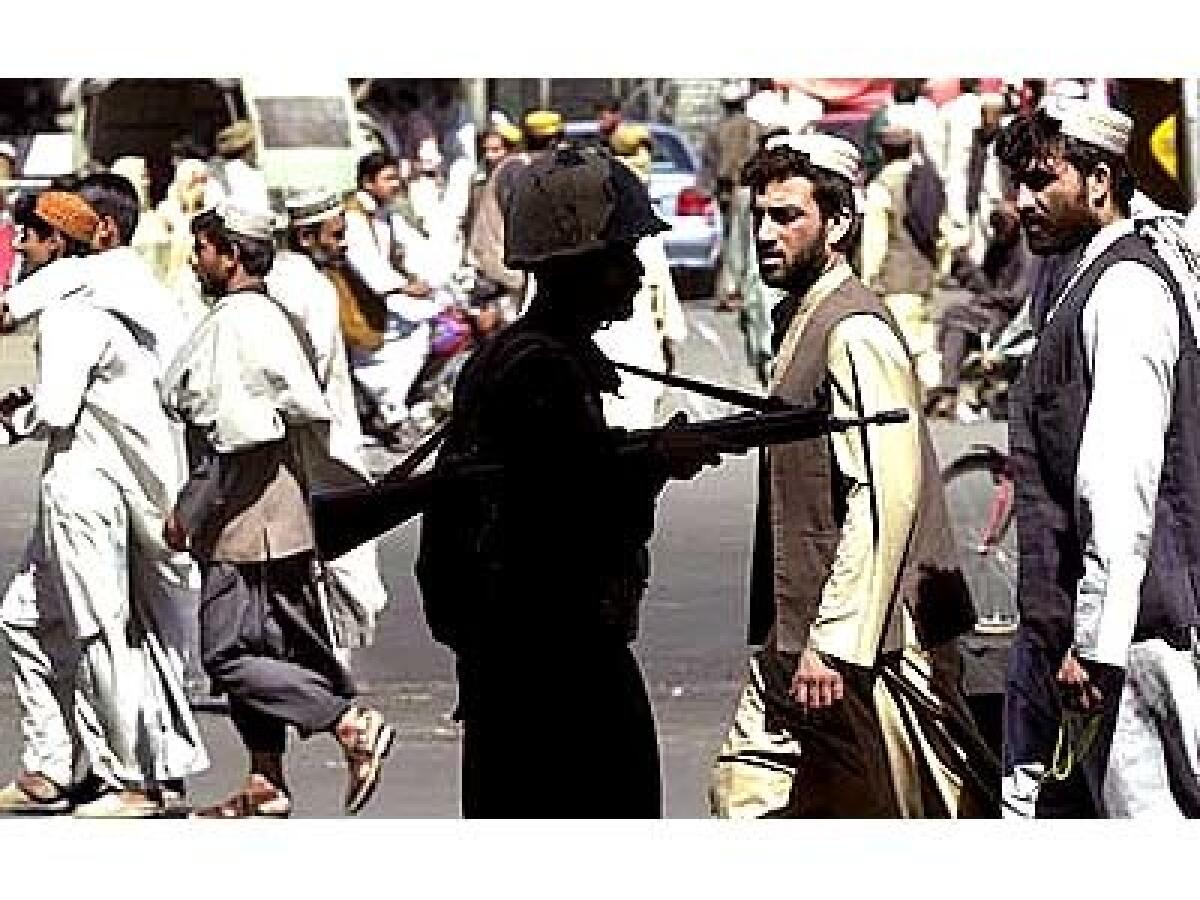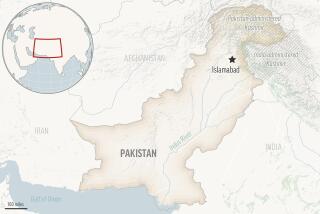Edgy Times in Pakistani Border Town

Paramilitary forces patrol in the Pakistani city of Quetta, near the Afghan border. Four Taliban supporters were killed in street clashes with police near the city.
- Share via
QUETTA, Pakistan — Armored personnel carriers stand at key intersections. Gun-toting police patrol on foot through the markets in twos and threes while their colleagues with shotguns watch warily from rooftops. Burned-out hulks of cars and buses still litter the road near the center of town.
Two days after fierce riots to protest the U.S. bombing campaign in nearby Afghanistan, Quetta and its surrounding province of Baluchistan have the feel of occupied territory, where an amalgamation of the constabulary, reserve police units and the paramilitary Frontier Corps barely suppresses the anger simmering just beneath the surface.
In all but name, this is Taliban territory. The radical Islamic parties of the region have set up hundreds of madrasas, or religious schools, that turn out shock troops for the fundamentalist Taliban movement in Afghanistan. And since U.S. airstrikes began Sunday night, clerics and party leaders in Quetta have been inciting the masses to regard all foreigners as enemies of Islam.
The authorities’ tenuous hold on public order was demonstrated Wednesday when police tried to escort a convoy of journalists from the city’s main hotel to the Chaman border post, a 60-mile journey that takes about three hours because of poor road conditions, heavy truck traffic and frequent checkpoints.
They didn’t make it that far.
As the convoy crested a rise in the arid wasteland near the Saranwan refugee camp, about 25 miles north of Quetta, a mob of 1,000 to 2,000 men and boys waving sticks and carrying white Taliban flags and the zebra-striped banner of Pakistan’s radical Jamiat-ul-Ulema-e-Islam party suddenly emerged from the haze and dust like a fierce mirage.
Apparently tipped off by watchers along the route that the convoy would be arriving, the crowd ran at full tilt and swarmed onto the road, their chants of “Death to America!” filling the air.
The first police vehicle, a covered pickup truck with soldiers in back, burst through the throng, followed by about half of the 15 journalists’ vehicles. But the tail end of the convoy was cut off when the mob occupied the highway that is touted locally as Pakistan’s “Gateway to Central Asia.”
There was a mad scramble of the remaining cars carrying journalists and the other two police vehicles to make U-turns and flee. In the confusion, Ayub Tareen, a Pakistani reporter for the BBC’s Pushtun-language service, was left behind.
Tareen had alighted from his car before he realized the danger. When he finally looked behind, he saw that his transport was gone.
“I ran for about 20 yards, and then I realized it was useless,” he recounted. So he pulled out a microphone and his digital tape recorder, and stood to face his attackers.
According to Tareen, he was spared only because he was able to explain rapidly that he was a Pakistani and an ethnic Pushtun--the dominant ethnic group in the area, and one from which the Taliban draws most of its support. The crowd held him in a circle, and the mullah who seemed to be in charge gestured that he should not be harmed.
“They were very, very angry. They were saying, ‘Death to America,’ ‘We suck the blood of America’ and ‘We support the Taliban,’ ” Tareen said.
After getting their protests on tape, Tareen was allowed to hitch a ride on a passing truck back toward Quetta. (The journalists who had passed through the throng were escorted back to the city by another route.)
As a result of the violence in the region, foreign workers for U.N. agencies have been ordered to move into the Serena, a Moorish-style luxury hotel that was already serving as the headquarters of the international press corps in this city.
Police protecting the guests reluctantly agreed to escort another convoy of reporters and camera crews through the center of Quetta late in the day. From every corner, the journalists were greeted by sullen, hostile stares.
The xenophobic attitude spreading from the Taliban movement is turning up elsewhere along the Afghan border and was also displayed afresh Wednesday in Afghanistan.
In recent days, Taliban followers attacked local staff workers affiliated with a U.N. mine-clearance program in the capital, Kabul, and the cities of Kandahar and Jalalabad, apparently seeking out one of the few remaining vestiges of a foreign presence in Afghanistan to vent their frustrations and anger. International staff linked to the program were evacuated shortly after the Sept. 11 terrorist attacks on the United States. On Monday night, four Afghan workers in a U.N.-affiliated mine-clearing operation were killed during an American air raid on Kabul.
“It seems to be part of a pattern in Afghanistan,” said a U.N. official who declined to be identified. The official said that mine-clearance program offices in the northern city of Mazar-i-Sharif were also looted by Taliban followers.
“It seems to be a sign of desperation,” said an Islamabad-based Western diplomat. “They aren’t sure what to do.”
Times staff writer Tyler Marshall in Islamabad contributed to this report.
More to Read
Sign up for Essential California
The most important California stories and recommendations in your inbox every morning.
You may occasionally receive promotional content from the Los Angeles Times.













